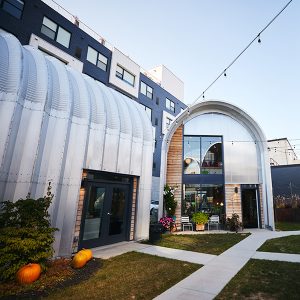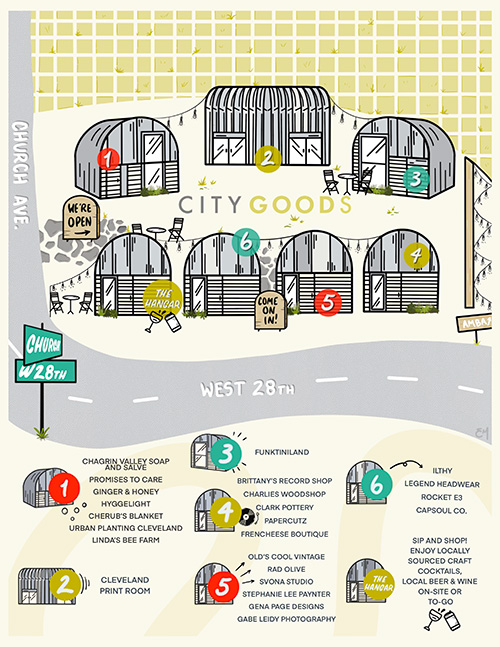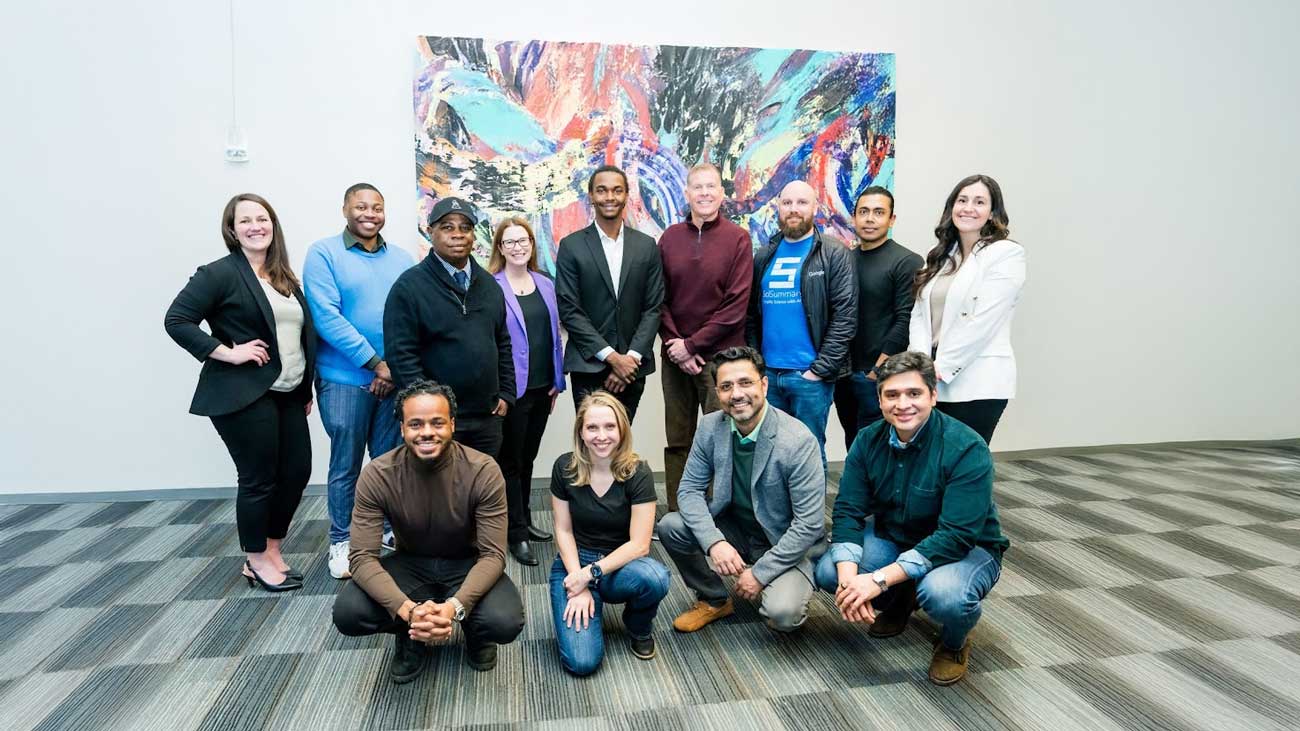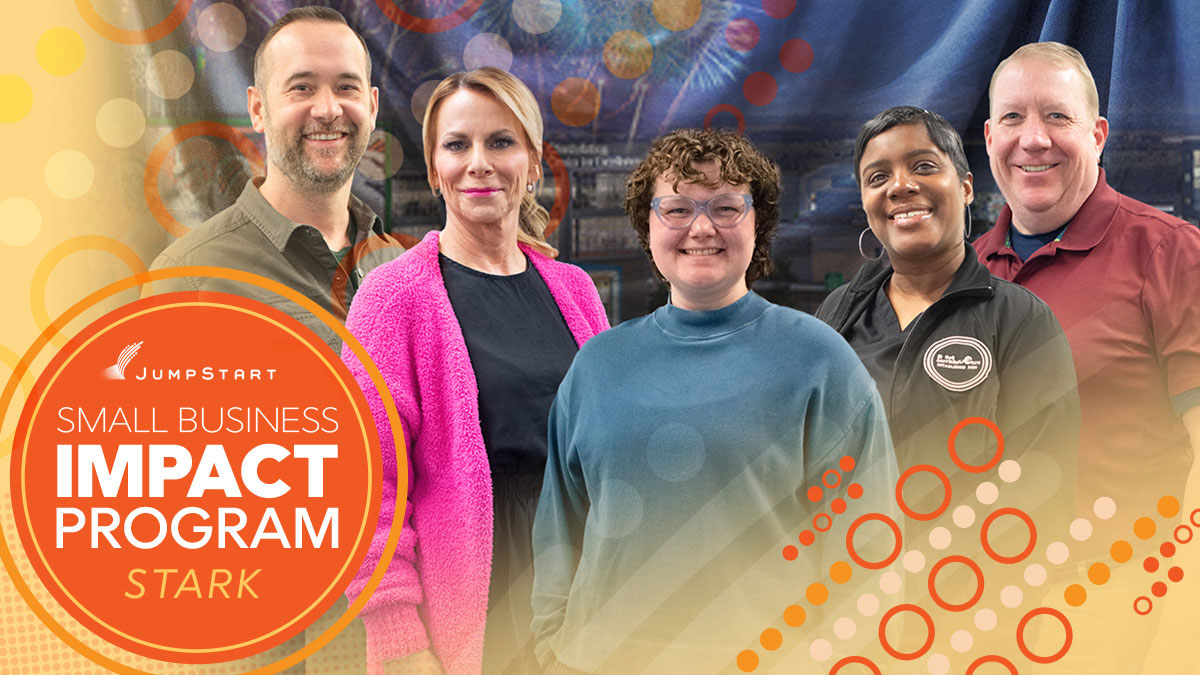A strong small business network has the potential to propel an entrepreneur to new heights, especially if they run a retail shop. For artisans and makers, particularly those in the early stages, things like rent, utilities and staffing can add up quickly. Plus setting up shop in the right location is paramount since foot traffic is a significant factor in the success of their businesses.
When Sam Friedman launched City Goods earlier this year in Cleveland’s Hingetown District to provide local makers, sellers and small businesses a place in the retail real-world, he was no stranger to the limited rental options available for local retailers. Sam knows all about the obstacles of running a retail business.
Sam owns and operates Chagrin Valley Soaps & Salves, USDA-Organic Certified, all-natural skincare products. As a 20-year-old operation started by Sam’s mother, Chagrin Valley Soaps & Salves has literally and figuratively been around the block in Northeast Ohio, bouncing from shop space in the Arcade downtown to their current headquarters in Solon.
For years, he and his mother whipped up hand-made, small-batch soaps, shampoos and salves as Sam navigated the challenges of small business ownership, trying to recalculate an equation that always left local entrepreneurs in the red. What he landed on was co-operative-type business model; an entity that could meet the needs and objectives of hyper-local business owners while promoting economic sustainability and community enrichment.
 City Goods, the open-air market space tucked into the burgeoning Hingetown District, boasts seven “hangars” that can each hold up to five local brands. Sam says in its shortest form, City Goods is a concept designed to both support and showcase local, handmade, artisan businesses.
City Goods, the open-air market space tucked into the burgeoning Hingetown District, boasts seven “hangars” that can each hold up to five local brands. Sam says in its shortest form, City Goods is a concept designed to both support and showcase local, handmade, artisan businesses.
According to Sam, City Goods operates a sort of dual system co-op – a shared/subsidized model where basic costs, including rent and utilities, are shared and all other operating costs are generated by the proceeds from the bar that are re-invested into the organization.
“The business plan is a bit of a Frankenstein,” says Sam.
A key aspect of Sam’s vision is the Hanger Bar at City Goods, an outpost among the stores that exclusively features local products from a curated list of 17 local distilleries, six local wineries and over a dozen local breweries. Patrons are encouraged to take their drinks out of the Hanger Bar and explore the entire licensed area for a sip-and-shop experience that makes supporting local businesses easy.
Not only does the bar extend the mission of City Goods, but it also plays a crucial role in the self-sustaining model; the proceeds generated from the drinks go back into the collective and help subsidize rent.
In this way, with low rent, minimal overhead and pedestrians, City Goods is providing early-stage entrepreneurs with the opportunity to determine what is – and often more importantly, what isn’t – possible in their retail concepts.
“I think a lot of people have had fantasies about what they could or couldn’t do or might or might not do,” Sam says. “And you never know what might have been when you’re standing behind a plastic table at a craft market.”
 Currently, there are 30 small businesses in City Good’s hangers that span multiple industries, including Linda’s Bee Farm, a family-owned apiary that makes honey-infused health and beauty products, Capsoul Co, a cutting-edge luggage brand, the Cleveland Print Room, a nonprofit dedicated to photography and many more. Sam’s vision goes beyond providing affordable rental opportunities and the stats offer proof of his commitment to diversity and inclusion; 70 percent of the shops in the hangers are female-owned businesses and 30 percent are minority-owned.
Currently, there are 30 small businesses in City Good’s hangers that span multiple industries, including Linda’s Bee Farm, a family-owned apiary that makes honey-infused health and beauty products, Capsoul Co, a cutting-edge luggage brand, the Cleveland Print Room, a nonprofit dedicated to photography and many more. Sam’s vision goes beyond providing affordable rental opportunities and the stats offer proof of his commitment to diversity and inclusion; 70 percent of the shops in the hangers are female-owned businesses and 30 percent are minority-owned.
His resume may say otherwise, but Sam swears up and down that he never intended to be a business owner.
“I was supposed to be an artist,” Sam explains. By the time he was nineteen, he had founded a theater company and nonprofit, and was directing performances and producing plays. “I have always had an entrepreneurial-type spirit, but it was never about business, and it certainly was never about money or profit.”
When Sam set out to implement the concept of City Goods last year, he contacted Cleveland State University’s Small Business Development Center, where he was able to get assistance with basic accounting, help setting up QuickBooks and a recommendation to connect with JumpStart.
Since then, Sam and his business partner Liz, have been meeting with JumpStart’s advisors and getting help with the complexities of determining financial projections in a co-op model. Northeast Ohio’s entrepreneurial network is organically interconnected, in fact, current JumpStart Small Business Impact Program participant Funktini, an eclectic collection of local and vintage artwork, home goods and more, is occupying Hanger 3 at City Goods.
City Goods is more than just a marketplace. It’s a holistic business support system for small business owners, artisans, designers, makers and creators – a plug-and-play opportunity to showcase their talents and products. City Goods isn’t just a snapshot of entrepreneurship, it’s a movement that nurtures Cleveland’s small business economy and encourages consumers to purchase with a purpose.





